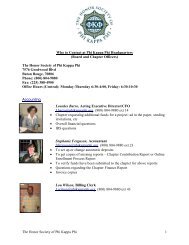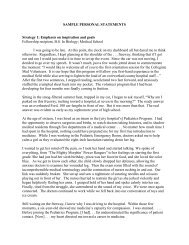Home Economics: - Phi Kappa Phi
Home Economics: - Phi Kappa Phi
Home Economics: - Phi Kappa Phi
You also want an ePaper? Increase the reach of your titles
YUMPU automatically turns print PDFs into web optimized ePapers that Google loves.
these topics were refracted through the<br />
prisms of economic, political, ethical, religious,<br />
and cultural forces, what emerged<br />
was a sophisticated plan for providing all<br />
people opportunities to understand themselves<br />
and the planet, to become collaborative<br />
and responsible citizens within a just<br />
society. For instance, home economics students<br />
in secondary schools should not<br />
simply learn to sew. They should also<br />
explore the reasons young people believe<br />
they have to wear designer jeans<br />
to fit in, the effects of indigo dye<br />
on the environment, and the<br />
dangers of unsanitary sweatshops<br />
worldwide that make the jeans.<br />
Further, foods classes, beyond<br />
teaching preparation skills, also<br />
must address reasons why in<br />
some communities fast food restaurants<br />
serve as the grocery<br />
store, for instance.<br />
Current concerns<br />
Not everyone has embraced<br />
this innovative agenda for home<br />
economics, though. Some instructors<br />
continue to teach<br />
applied skills to improve daily<br />
necessities, believing that the<br />
goal of educational programs is<br />
to assist students in making informed decisions.<br />
Others, who receive vocational<br />
funding, teach skills for gainful employment.<br />
However, for those who agree with<br />
Brown and Paolucci — and I do — that the<br />
imperative of home economics education is<br />
to evaluate social conventions to determine<br />
if there might be better ways to live, the<br />
territory reaches beyond discipline boundaries<br />
and obliges people to think, create,<br />
and act in the best interest of all humans<br />
and the environment.<br />
Although home economics has evolved to<br />
meet current societal challenges and gained<br />
visibility with vocational education, it has<br />
been losing standing in political circles.<br />
And, in 1993, five leading associations (including<br />
the American <strong>Home</strong> <strong>Economics</strong> Association)<br />
recommended changing the name<br />
of home economics to family and consumer<br />
sciences. 10 The question was: Does the name<br />
“home economics” reflect the society and<br />
the times? After considerable debate, the<br />
answer was no, and the name change was<br />
adopted by those associations. Following<br />
suit, secondary schools, higher education,<br />
and advocacy organizations replaced their<br />
program titles from home economics to<br />
human sciences, human ecology, human development,<br />
family studies, family and consumer<br />
sciences, and the like.<br />
The best of intentions sometimes don’t<br />
pan out. One upshot has been a lack of<br />
across-the-board identity and confusion regarding<br />
relevance. High school programs,<br />
generally once required nationwide,<br />
became electives or were pared down in<br />
some states. Some colleges and universities<br />
folded the five areas of emphasis in this<br />
interdisciplinary profession into the<br />
respective domains. And many home<br />
economics education programs in higher<br />
education were simply shut down. Damaging<br />
misconceptions cropped up; even<br />
though high school programs’ names were<br />
changed, the content remained largely the<br />
same, and students at the university level<br />
who selected a degree in one of these newtitled<br />
programs had difficulties explaining<br />
what the field encompassed. Paradoxically,<br />
This 1942 home economics<br />
class occurs at a migratory workers<br />
community in Eleven Mile Corner, Ariz.<br />
the successful fight against sexism gave<br />
women, who formed most of the discipline’s<br />
students and instructors, new lines<br />
of work beyond home economics (and<br />
nursing and education). And more people<br />
specialized in one of the more recognized<br />
components of home economics like nutrition<br />
science, family studies, and child development,<br />
which ultimately became their<br />
own departments.<br />
(I, for one, continue to identify myself as<br />
a home economist not simply because my<br />
degrees are in this field but also because I<br />
remember Brown, one of my mentors,<br />
telling me that rebranding wouldn’t move<br />
us forward; relevance would. I believe the<br />
name change was more about trying to<br />
seem with-it, about public relations and<br />
marketing, than about the essence of the<br />
work. Additionally, the U.S. was the only<br />
country that changed the profession’s<br />
name; all other countries refer to the endeavor<br />
as home economics.)<br />
Several theories beyond the above consequences<br />
attempt to explain why home<br />
economics has waned in visibility and importance.<br />
The general public contends the<br />
profession to be largely what they remember<br />
from secondary school programs: basic<br />
skills for living and, therefore, expendable.<br />
Others question whether a program dedicated<br />
to improving the quality of life for individuals,<br />
families, and communities is unrealistic,<br />
oversimplified, naïve, outdated.<br />
But many experts aver that the heart of<br />
home economics coincides with human<br />
freedom within a just society. Thus, this<br />
profession, by whatever name, can offer<br />
viable solutions to perennial challenges and<br />
current ones, such as the obesity epidemic,<br />
recession fallout, global warming, illegal<br />
immigration, senior care, teen pregnancy,<br />
cyber bullying, runaway youth, homeless<br />
people, and military families. <strong>Home</strong> economists<br />
apply a holistic approach — from the<br />
wallet to the domicile, from physical health<br />
to mental health, from laws on the books to<br />
prejudices in the air — to all constituents,<br />
meaning most of the populace.<br />
So long as people make decisions within<br />
a global community about what<br />
to wear and eat, where to live<br />
and work, how to manage finances<br />
and living spaces, not to<br />
mention ways to raise children<br />
and interact with others, there<br />
will be a need for home economics.<br />
Individual concentrations<br />
and school programs like<br />
chemistry and economics can’t<br />
tackle these issues alone. Nor<br />
does any other profession have<br />
a history of critiquing and formulating<br />
social goals and<br />
means for accomplishing them<br />
with the intent of improving the<br />
quality of life worldwide.<br />
Should the desire for an integrated<br />
disciplinary strategy<br />
emerge as a viable response to<br />
today’s troubles, a careful investigation of<br />
home economics might yield sound evidence<br />
of making a positive difference, as it<br />
has for more than a century. n<br />
Yvonne S. Gentzler is<br />
Associate Professor of Family,<br />
Youth and Community in the<br />
Department of Curriculum<br />
and Instruction at University<br />
of Minnesota. She won<br />
the Advancing Women’s<br />
Leadership Award in 1994<br />
from the Women’s Leadership Institute at Wells<br />
College for work on social issues in Pennsylvania<br />
and developed the Family and Consumer<br />
Sciences Education Leadership Academy at<br />
Iowa State University. The seventh edition of her<br />
textbook Building Life Skills, coauthored with<br />
Louise A. Liddell, will be released later this year<br />
by Goodheart-Willcox. Scholarly articles Gentzler<br />
wrote or co-wrote have appeared in peerreviewed<br />
publications including the International<br />
Journal of <strong>Home</strong> <strong>Economics</strong> and the Journal of<br />
Family and Consumer Sciences. She presents<br />
regularly at annual meetings of the American<br />
Association of Family and Consumer Sciences,<br />
which named her the 2007 National Outstanding<br />
Family and Consumer Sciences Teacher<br />
Educator. Gentzler has taught at numerous other<br />
universities and earned degrees from Geneva<br />
College (B.A. in biblical studies), Messiah College<br />
(B.S. in home economics education), and<br />
The Pennsylvania State University (M.Ed. and<br />
Ph.D. in home economics education). Email her at<br />
gentzler@umn.edu.<br />
For footnotes and more photos, go online to<br />
www.phikappaphi.org/forum/summer2012.<br />
Summer 2012 7






